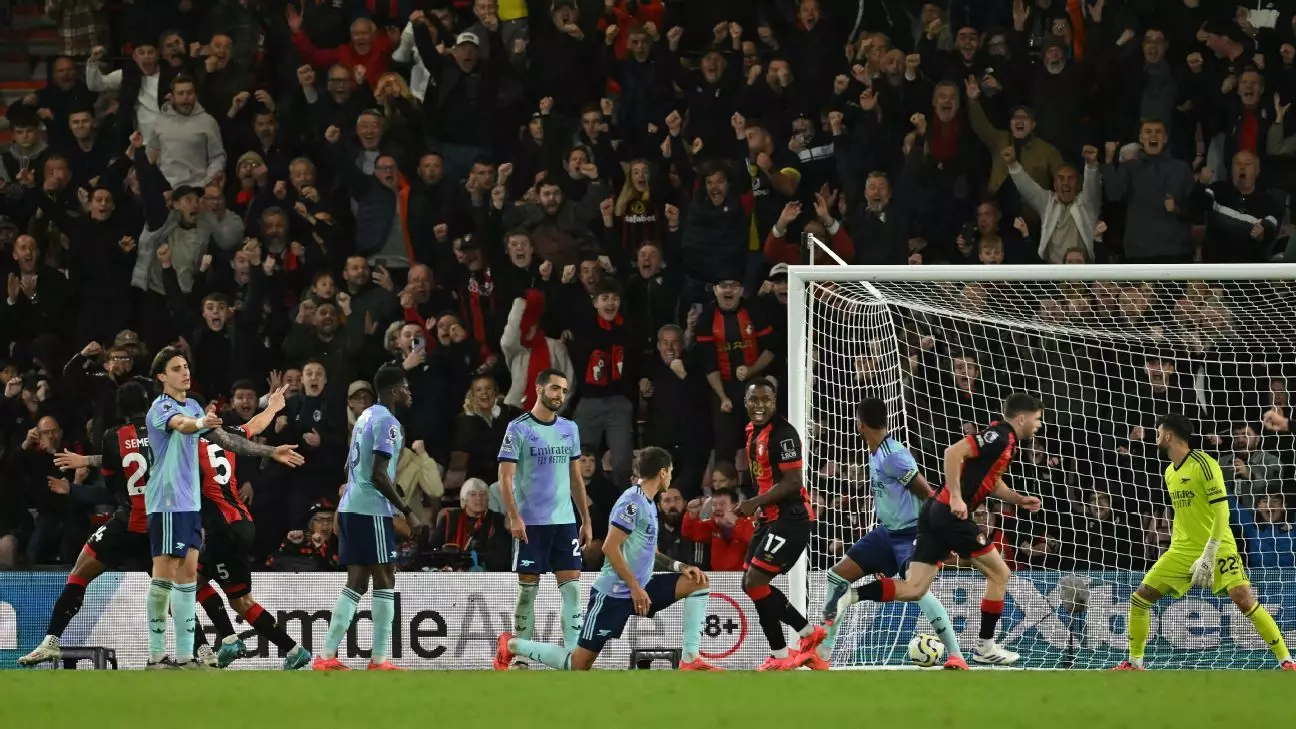In a season already marked by inconsistency, Arsenal’s latest setback against Bournemouth has intensified discussions around the team’s tactical approach and player discipline. The Gunners suffered a disappointing 2-0 defeat, marred by the third red card of the season, underscoring a troubling trend of self-inflicted wounds. Declan Rice’s candid assessment of the match encapsulated the frustration felt by players and fans alike, emphasizing the team’s inability to maintain composure when faced with adversity.
Hinging on a pivotal moment in the 30th minute, the match took a decisive turn when William Saliba received a red card following a questionable VAR decision for a foul on Evanilson. This dismissal was the culmination of a series of errors that have characterized Arsenal’s campaign. Without Saliba, the Gunners not only lost a key defensive asset but also shifted the dynamics of the game, allowing Bournemouth to seize control and assert their dominance.
As fans watched on with mounting despair, Arsenal’s inability to capitalize on pivotal chances became painfully evident. Gabriel Martinelli’s squandered opportunity—where he was denied at close range—was the tipping point that allowed Bournemouth to regain their momentum. Mikel Arteta’s frustration following the match echoed through Rice’s remarks; both recognized the significance of key moments in determining a match’s outcome. “We had the big chance, and then we conceded a goal,” Arteta lamented, pointing to the consequential shift in the game’s tide.
Critically, the recurring theme of losing players to red cards raises questions about the tactical discipline instilled within the squad. What seems like naive errors on the pitch not only jeopardize on-field performances but severely impact the team’s overall standings. Arsenal now finds itself walking a tightrope, caught between their attacking ambitions and the need for a more pragmatic approach to match management.
Despite the disheartening loss, Rice’s acknowledgement of the team’s spirit is noteworthy. Arsenal displayed character in the face of being reduced to ten men, showcasing determination and fight that should not be overlooked. However, such resilience must translate into even stronger performances when the odds seem stacked against them. This mentality can be the foundation upon which they build consistency, but it must also be coupled with a keen awareness of the ramifications of their mistakes.
As the season progresses, it’s imperative for Arsenal’s management and players to foster an environment focused on learning from past encounters. The repeated mistakes—each leading to a similar fate—should not be swept under the rug. Instead, they offer pivotal lessons about maintaining discipline and seizing opportunities.
Looking ahead, the Gunners must cultivate a renewed focus if they wish to avoid further pitfalls. Rice’s assertion of the need for unity resonates deeply, highlighting that regardless of the challenges presented, success hinges on a collaborative effort. The belief within the squad remains high, but such belief must be matched by strategic adjustments and a reduction in careless errors.
Ultimately, Arsenal stands at a crossroads. Continuing down their current path of inconsistency could lead to a disheartening season filled with missed opportunities and frustration. However, with collective resolve and a critical reassessment of their approach, there lies potential for reclaiming their place among football’s elite. The footballing world is waiting to see if the Gunners can transform their naivety into wisdom as they navigate the challenges that lie ahead.

